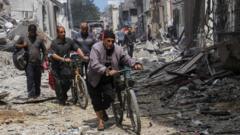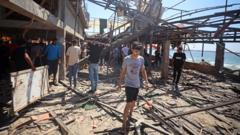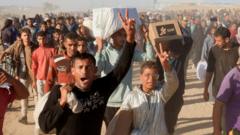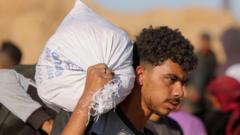As Israeli air strikes continue to escalate in Gaza, hundreds of families are forced to flee their homes amid a humanitarian crisis. With casualties rising, there is increasing pressure on Israeli leadership to consider a ceasefire.
Growing Humanitarian Crisis in Gaza as Air Strikes Displace Hundreds

Growing Humanitarian Crisis in Gaza as Air Strikes Displace Hundreds
Severe air raids by Israel lead to mass evacuations and a rising death toll in Gaza.
In a troubling escalation of violence, Israeli air strikes have intensified across the Gaza Strip, leading to the displacement of hundreds of Palestinian families, according to local sources. The surge of attacks has seen rescue teams retrieving five bodies, with many more injured civilians rushed to Al-Ahli Hospital in Gaza City. This wave of bombings follows what has been described as one of the largest evacuation orders since hostilities renewed in March, underscoring a growing humanitarian crisis that has attracted international attention.
Witnesses from Gaza City reported that the bombardment targeted densely populated areas, including neighborhoods such as Shujaiya, Tuffah, and Zeitoun. Activists shared videos on social media, depicting the chaos of explosions lighting up the night sky, followed by massive plumes of smoke rising ominously above the cityscape. One reported strike even hit a school in Zeitoun, which was serving as a refuge for displaced families, exacerbating concerns over the safety of civilians.
The Al Shati refugee camp, located west of Gaza City, was the site of the five fatalities linked to a recent air strike. In anticipation of further attacks, the Israel Defense Forces (IDF) had previously urged residents to evacuate large portions of northern Gaza. Many fleeing families redirected their movement west within Gaza City, defying instructions to head southward.
Abeer Talba, a mother of seven who was forced to abandon her home in Zeitoun, expressed desperation in the face of impending danger. "We had no choice but to leave everything behind," she stated. "We're back on the streets again, with no food or water. My children are starving." Her story reflects the recurring trauma of displacement, as she noted it was the seventh time her family had been forced to flee their home.
As humanitarian needs escalate and the situation grows increasingly dire, fears are mounting that the IDF's evacuation orders and ongoing bombardments signal a broader strategy for an expanded ground offensive into Gaza. However, reports from Israeli media suggest there is growing sentiment among military leaders that a resolution may soon be possible. Nevertheless, former army officials express concern that should military operations devolve into protracted guerilla warfare, casualties could rise among civilians, hostages, and soldiers alike.
With the Israeli prime minister, Benjamin Netanyahu, traditionally favoring military action against Hamas, the increasing calls for a ceasefire from both domestic and international fronts are beginning to influence the dialogue surrounding Israel's next moves.





















